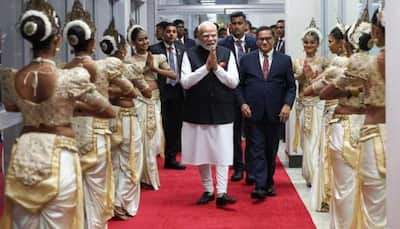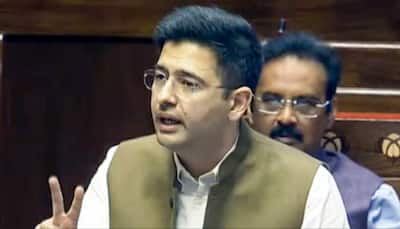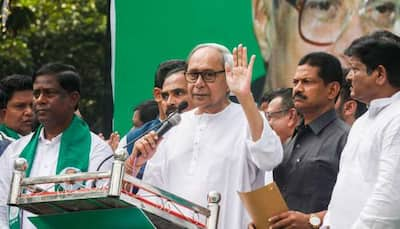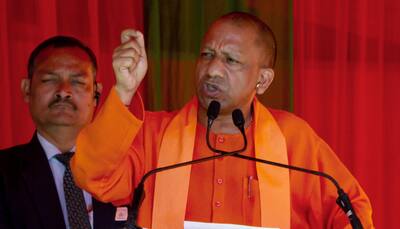Aam Aadmi Party (AAP) leader and Rajya Sabha MP Raghav Chadha on Thursday raised concerns pertaining to the government’s policies regarding the entry of US-based company Starlink and the US-imposed tariffs on Indian goods.
While speaking in the Rajya Sabha, Chadha sought clarification from the government on national security, data privacy, and the potential misuse of Starlink before granting it approval. This discussion took place as the PM Modi-led central government gears up to issue a broadband services license to Starlink.
The AAP MP suggested in Parliament that the PM Modi-led government should withhold approvals for billionaire Elon Musk’s Starlink satellite internet services as a bargaining chip to renegotiate the 27 percent tariffs imposed by the Trump administration on Indian goods.
Raising the issue during the Question Hour in the Rajya Sabha, Chadha expressed concerns over the impact of US tariffs on the Indian economy, saying they could hit the country by “50-100 basis points in terms of GDP loss.” “Should we not withhold the requisite approvals for Elon Musk’s Starlink, who is the visible part of the US administration, and use that as a bargaining chip to renegotiate the Trump tariffs?” Chadha asked.
The AAP MP claimed India has shown “unflinching loyalty and friendship” to the US, but despite this, the Trump administration has imposed high tariffs that could “wreck the Indian economy.” “India rolled out the red carpet for the US, but in return, we got tariffs,” he said, and sang a few lines of the Bollywood song ‘Accha sila diya tune mere pyaar ka, yaar ne hi loot liya ghar yaar ka…”
While speaking in the Upper House, the AAP MP also highlighted that last week the finance minister moved an amendment to remove the ‘Google’ tax’—an equalization levy of 6 percent on US companies like Meta and Amazon—causing India a loss of Rs 3,000 crore.
Communications Minister Jyotiraditya Scindia responded by emphasizing his consumer-centric approach, “I am company agnostic; I am citizen-centric,” while outlining security measures for satellite networks in India.
Scindia outlined the government’s role in providing cutting-edge technology to Indian consumers while maintaining strict security protocols. “It is my job to provide every opportunity and available technology in the world to every single consumer in the country.”
The minister highlighted that the government has already granted two licences to two Indian companies—Reliance and Bharti Airtel—for satellite technology. It may be noted that last month, both announced deals with SpaceX to bring Starlink services to India, subject to regulatory approvals.
“If you are able to satisfy all those requirements, which are the same for every provider of satellite communications, the doors of India are open to you. The customer will decide which provider they want to go with,” the minister added.
When Chadha raised concerns about potential misuse of Starlink’s services, citing a recent drug bust in Andaman where smugglers allegedly used Starlink for navigation, and when the Indian government sought information, Starlink refused, citing data privacy laws. Rajya Sabha Chairman Jagdeep Dhankar interjected, saying the AAP leader appeared “severely obsessed” with issues concerning US President Donald Trump and Elon Musk, and urged him to raise questions that were “little Indianized.”
Chadha retorted, “I am severely obsessed with anything which affects India’s interest, particularly the Indian economy. That is what brings me to this House. I will continue to passionately raise every issue.”
Minister of State for Communications Chandra Shekhar Pemmasani sought to “remove some misconceptions” about Starlink, noting that India’s terrestrial broadband speed is 188 times faster than what Starlink or any other satellites can provide. He added that Starlink’s global customer base of 46 lakh over three years is meager compared to India’s 990 crore broadband connections.
Scindia later detailed the security protocols in place for satellite communication providers, including mandatory establishment of earth station gateways in India, operational control centres on Indian soil, and ensuring all traffic for Indian customers passes through domestic gateways.
The minister also emphasized India’s position as the world’s cheapest telecom market, with data costs at just 11 cents per GB compared to the global average of USD 2.59, making it an attractive destination for global data businesses.
Stay informed on all the , real-time updates, and follow all the important headlines in and on Zee News.









